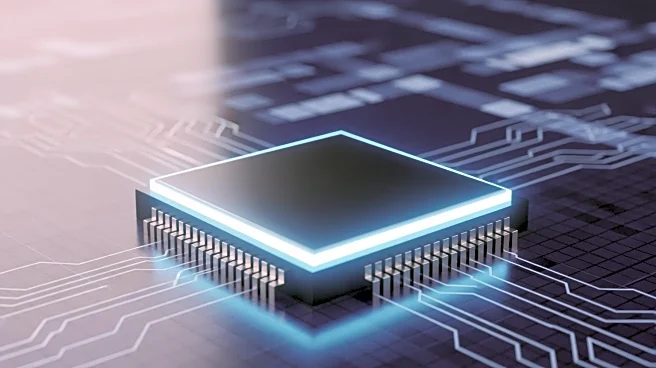What's Happening?
Intel Corporation has reported its first quarterly profit in nearly two years, marking a significant turnaround under the leadership of its new chief executive, Lip-Bu Tan. The semiconductor giant posted
a net income of $4.1 billion for the third quarter, a stark contrast to the over $16 billion loss recorded in the same period last year. This positive financial performance has led to a notable increase in Intel's stock price, which at its peak was trading over 115% above its year-to-date low. The company's better-than-expected earnings come amid reports that Microsoft has chosen Intel to manufacture its next-generation Maia artificial intelligence chips using Intel's advanced 18A process. Additionally, Advanced Micro Devices is reportedly in early discussions to utilize Intel's foundry services for its sophisticated chips. These developments suggest a potential long-term success for Intel in the AI sector.
Why It's Important?
Intel's return to profitability and strategic partnerships with major tech companies like Microsoft and potentially AMD could significantly impact the semiconductor industry. The company's ability to secure commitments from industry leaders such as Nvidia, Softbank, and the White House to bolster its foundry operations against competitors like Taiwan Semiconductor indicates a strong position in the market. This turnaround could enhance Intel's reputation as a key player in the AI chip manufacturing space, potentially attracting more business from hyperscalers and boosting its stock value. However, Wall Street remains divided on Intel's long-term prospects, suggesting that while the current developments are promising, challenges still exist.
What's Next?
Options traders are optimistic about Intel's stock performance, with contracts expiring in January indicating potential for the shares to reach new highs above $45. In the short term, Intel's stock is expected to experience a 6.01% movement, with a possible upper bound of $40.92. The company's strategic initiatives and partnerships could lead to further growth and solidify its position in the semiconductor industry. Investors will be closely monitoring Intel's ability to maintain its momentum and capitalize on the opportunities presented by its recent successes.
Beyond the Headlines
Intel's resurgence in profitability and strategic alliances highlight the evolving dynamics in the semiconductor industry, particularly in the AI sector. The company's ability to leverage its advanced manufacturing processes and attract major tech companies could lead to a shift in market power, challenging established players like Taiwan Semiconductor. This development underscores the importance of innovation and strategic partnerships in maintaining competitiveness in the rapidly changing tech landscape.









